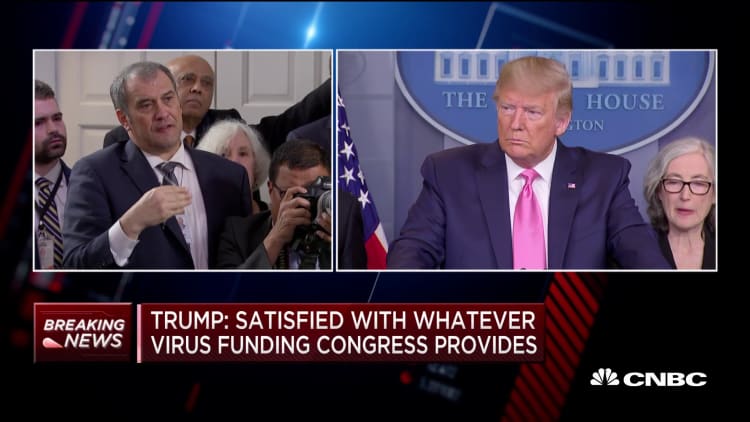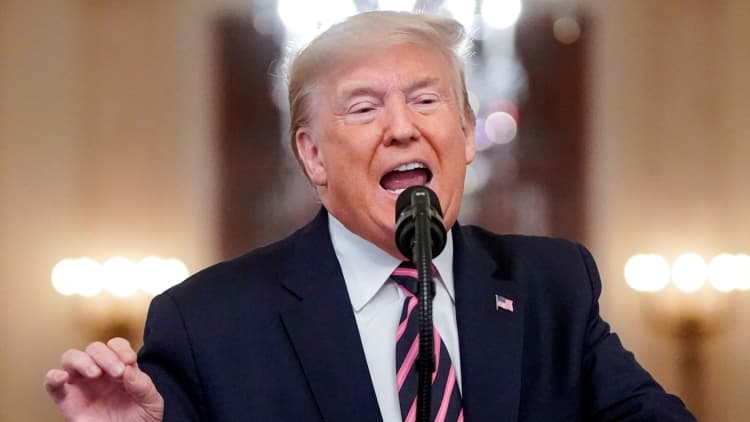President Donald Trump's campaign sued The New York Times on Wednesday for libel over an opinion article, saying the newspaper published its allegedly false claims last year with the "intentional purpose" of damaging Trump's chances for reelection this year.
The campaign said that the Times falsely reported "as fact a conspiracy with Russia" in the op-ed written by Max Frankel, which was published on March 27, 2019, under the headline "The Real Trump-Russia Quid Pro Quo."
Frankel is a former executive editor of the newspaper.

The lawsuit, which was filed in New York State Supreme Court in Manhattan, claims "millions" of dollars in damages, but does not give a specific monetary amount.
Among other things, the suit alleges that the newspaper "has engaged in a systematic pattern of bias" against Trump's campaign, which is designed to damage the campaign's reputation and cause it to fail.
A Times spokesman said, "The Trump Campaign has turned to the courts to try to punish an opinion writer for having an opinion they find unacceptable."
"Fortunately, the law protects the right of Americans to express their judgments and conclusions, especially about events of public importance. We look forward to vindicating that right in this case," the spokesman said.
Frankel declined to comment.
"No, I'm going to leave that to The Times," he told CNBC.
Sen. Bernie Sanders of Vermont, an independent who is seeking the Democratic presidential nomination, said that Trump was "taking a page from his dictator friends around the world" by "trying to dismantle the right to a free press in the First Amendment by suing The New York Times for publishing an opinion column about his dangerous relationship with Russia."
The so-called subhead, or secondary headline on Frankel's article said, "The campaign and the Kremlin had an overarching deal: help beat Hillary Clinton for a new pro-Russian foreign policy."
Frankel wrote, in the article's first paragraph, that during the 2016 election, "There was no need for detailed electoral collusion between the Trump campaign and Vladimir Putin's oligarchy because they had an overarching deal: the quid of help in the campaign against Hillary Clinton for the quo of a new pro-Russian foreign policy, starting with relief from the Obama administration's burdensome economic sanctions."
"The Trumpites knew about the quid and held out the prospect of the quo," Frankel wrote.
The lawsuit, in its opening sentence, noted the article's subhead and Frankel's lead paragraph.
"The Times was well aware when it published these statements that they were not true," the suit said.
"The Times' own previous reporting had confirmed the falsity of these statements," the suit said.
"There was no 'deal' and no 'quid pro quo' between the Campaign or anyone affiliated with it, and Vladimir Putin or the Russian government," the suit stated.
And the suit also said that "the falsity of the story has been confirmed" by the report issued in April 2019 by then-special counsel Robert Mueller, who investigated Russian interference in the 2016 election.
"But The Times published these statements anyway, knowing them to be false, and knowing it would misinform and mislead its own readers, because of The Times' extreme bias against and animosity toward the Campaign, and The Times' exuberance to improperly influence the presidential election in November 2020"
Jenna Ellis, a legal advisor for Trump's campaign, said the statements in Frankel's article "were and are 100 percent false and defamatory."
"The complaint alleges The Times was aware of the falsity at the time it published them, but did so for the intentional purpose of hurting the campaign, while misleading its own readers in the process," Ellis said.

Trump has repeatedly called suggestions that his campaign colluded with Russian agents during the 2016 "a hoax."
Last year, Times CEO Mark Thompson called Trump's verbal attacks against individual journalists "stupid" and "dangerous."
"The president is entirely entitled to not like everything he reads in The New York Times, I get that," Thompson said in June at the CNBC Evolve forum in New York.
"He has every right to say he doesn't like the way we cover him or cover anything else. So this is not saying we shouldn't be criticized," Thompson said.
"But actually isolating journalists, as a group, not just the Times, but the whole industry, is a really frankly hostile, stupid but also dangerous thing to do."
— Additional reporting by CNBC's Kevin Breuninger.


